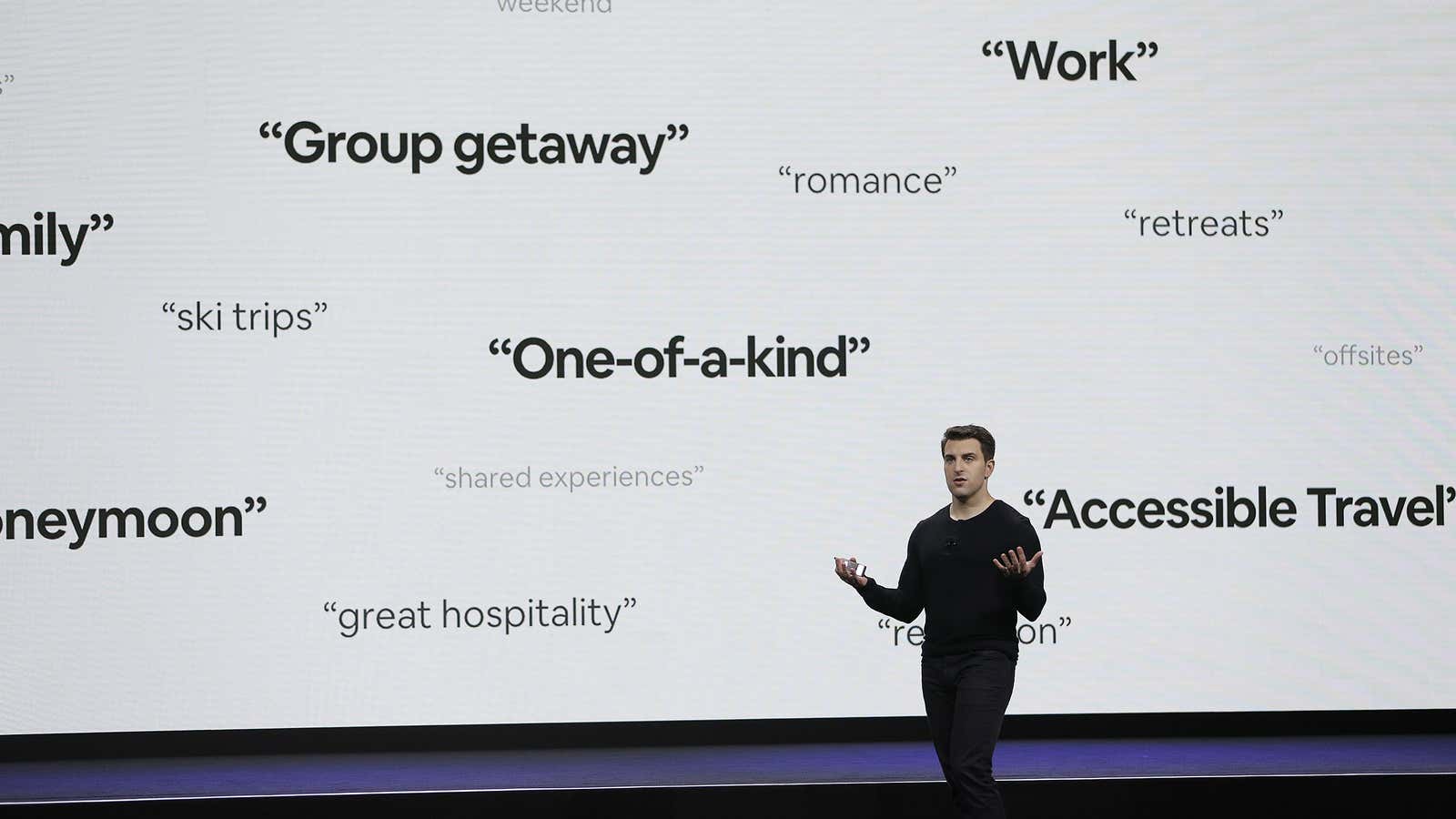When it came time to roll out new features last week, Airbnb did not go about it in a low key fashion. Trumpeting what they called the ”biggest changes to our platform in our 10-year history” the company sent invitations to users to watch a live stream of the announcement, which was presented to a theater of journalists and hosts in San Francisco.
It’s fair to say that the changes, while hardly seismic, are significant. Some address problems that the company would have done well to fix long ago, perhaps without quite as much fanfare—such as improved categorization of listings, so guests don’t have to wade through a bunch of properties they definitely don’t want. Others, meanwhile, can be seen as a strong signal of where the travel company is headed. The most significant change is arguably Airbnb Plus, a new tier of properties which are vetted on a 100 point criteria to ensure they provide above-average amenities and a consistent guest experience.
Early on, Airbnb had considerable quality control; its founders used to stay in and photograph the listings of early hosts in order to intimately understand the pitfalls—and selling points—of homesharing. But the company’s unprecedented growth over the past decade—it now has 4.5 million listings in 81,000 cities—has more or less left the task of quality assurance to the reviews section, with most issues being flagged after a negative guest experience, not before. Airbnb Plus, however, is a move back to those fastidious beginnings, with CEO Brian Chesky even bragging recently that “we literally test the Wi-Fi in every single Airbnb Plus home.”
Airbnb Plus is debuting in 13 cities with 2,000 homes, with an ambition to reach 75,000 homes in 50 destinations by the end of the year. So at this point you may be thinking: What’s the catch? Well, the ensured quality of higher-tier Plus listings also comes with a higher price tag. The average cost of a Plus listing is under $250 per night, compared to $100 per night for a regular Airbnb listing. A price index for hotels around the world from Hotels.com puts the average price of a hotel room in Los Angeles, Shanghai, and London (three of the cities where Plus is debuting) at $198, $158, $230 per night, respectively.
Airbnb says that Plus is not about favoring higher-revenue listings to help the company make more money in commissions. After all, a private room in a larger house (generally Airbnb’s cheapest option geared towards solo travelers) can still be considered a Plus listing, and the company has announced a separate forthcoming luxury tier called Beyond by Airbnb, which will presumably cater to big spenders. But what is clear is that Airbnb wants travelers who have higher standards and a lower tolerance for things going wrong to not be afraid of the platform. To lure hosts to apply for Airbnb Plus (and pay the $149 fee), Airbnb will reward them with “top placement, in-home services such as design consultation and expert photography, and premium support,” according to a press release.
So what does this mean for guests? It depends what kind of traveler you are. Historically, people with a $250 per night budget and a penchant for professionally laundered linens and efficient check-in had a clear option: checking into a hotel. Conversely, when Airbnb was founded, it was aimed squarely at people who were not only willing to tolerate some uncertainty for a lower price, but actually courted a non-cookie cutter stay as part of a more authentic travel experience.
While Airbnb clearly feels there is no reason they can’t bring their self-described brand of “magical travel” to both groups, some worry that the changes—along with the addition of actual hotel rooms and traditional bed and breakfasts to the platform—signal that Airbnb is turning away from that core usership.
It’s true that there are arguably plenty of compelling reasons to book an Airbnb Plus over a hotel room. Access to a kitchen, staying in a residential neighborhood, and having a local host to guide your trip come to mind. However, those used to staying in a hotel would also be giving up some perks if they opt for Plus, including using their preferred loyalty program (though Airbnb announced its own will launch this summer); a lobby or bar where they can work, entertain, or network; and the professional service standards implied by staying in a hotel.
Airbnb is clearly growing up and wants to go thoroughly mainstream. The question is if all of their earliest and most passionate adopters go with them.
